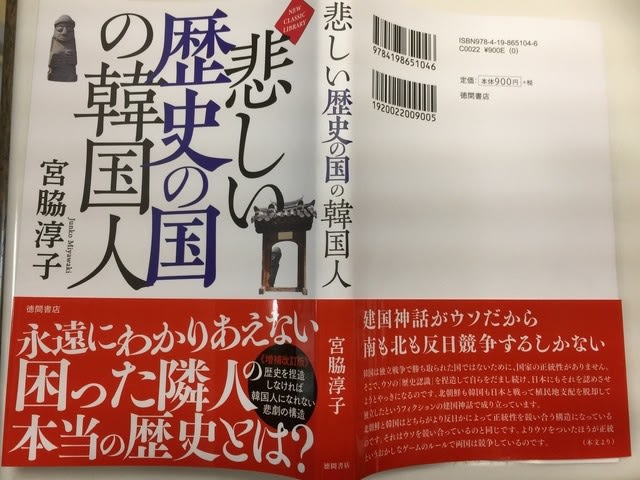The following is from a book I was recommended to subscribe to by a friend who is one of the leading readers.
It is written by Miyawaki Junko, one of the world's leading historians of the Orient.
She was introduced to me by Masayuki Takayama, the world's one and only journalist of the post-war era.
Her husband, the late Mr. Hidehiro Okada, the world's foremost historian, was mentioned many times by the great scholar, Prof. Hiroshi Furuta, who was never informed of his existence by the Asahi Shimbun.
I also think that Ms. Junko Miyawaki is one of the happiest people in the world.
She has the right eye for detail.
Alexis Dudden, who is nothing more than a Korean agent who controls the American Historical Society, and John Dower, who has made a name for himself as one of the anti-Japanese scholars in post-war Japan while playing fondly with Japanese women, need to take a lesson from her.
Her bright, lucid writing and consequently extreme readability also make her a first-rate scholar.
This book is a must-read, not only for the people of Japan but for people all over the world.
The Japanese people must subscribe to it now at their local bookstore or Amazon.
It is only 900 yen for a book filled with the scholarly achievements of real scholars.
Chapter 8: The Tragedy of the Korean Peninsula, Divided into North and South
Koreans killed each other in the middle of the Korean War.
The initial battle was a crushing victory for North Korea.
The South Korean army retreats in a total collapse.
President Syngman Rhee blows up a bridge on the Han River, abandons his men, and flees to Pusan on his own.
The UN commander MacArthur's landing at Incheon was successful, and the situation changed drastically, and the UN forces gained the upper hand.
So Syngman Rhee returned to Seoul, but what he did next was amazing.
In 1951, the Ganghwa massacre took place.
Ganghwa Island was briefly occupied and controlled by the North Korean military, and they massacred the islanders for supporting the North.
Besides, 90,000 South Korean soldiers were starved to death during the Korean War due to embezzlement of supplies by National Defense Force officials.
The only reason for this is that Syngman Rhee disliked Japan.
He didn't like Japanese military school graduates, he hated Japanese trained troops, and he didn't like anything under the influence of Japan.
In the middle of the Korean War, these same Koreans kill each other in a civil war.
It's a pattern that has been repeated over and over in the history of the Korean Peninsula when you have to fight against enemies at the same time as your fight among friends.
It reminds me of a Korean writer in Japan who said that his country's history is a history of internal strife amid an existential crisis.
* It reminds me of the fact that many of the current politicians in the Japanese opposition have inherited their DNA .*
In 1952, in January 1952, the Korean government declared the Rhee Syngman Line on its own, and Japanese fishing boats were frequently captured, Japanese fishers were killed, injured and interned.
Then, in April 1953, South Korea occupied Takeshima.
Amid the confusion, they pursued their interests recklessly, a common phenomenon on the Korean Peninsula.
For them, looters are the norm.
In the Korean War, a ceasefire agreement was agreed upon in July 1953, but it was only signed by the United States and not approved by South Korea.
Any of Korea's key officials did not sign it.
The Republic of Korea is not acting as a nation.
It is its own war, but it is someone else's business and has no initiative at all.
That's why the North brings up Juche and makes a mockery of South Korea.
Then, in 1954, President Syngman Rhee proposed a constitutional amendment to eliminate the constitution's provision that the president could not be elected three times.
It is the famous "Rounding Up Constitution."
The reason for this is that even though the vote was one vote short, rounding off the votes allowed three elections based on the majority in favor of the constitutional amendment.
It is a case that illustrates the laxity of their rule of law, which assumes that the law can be interpreted in any way they want.
This article continues.



















